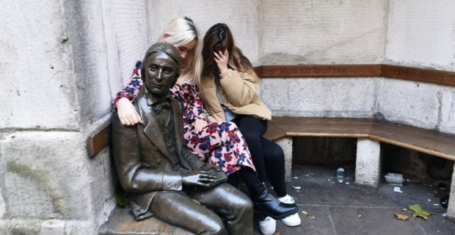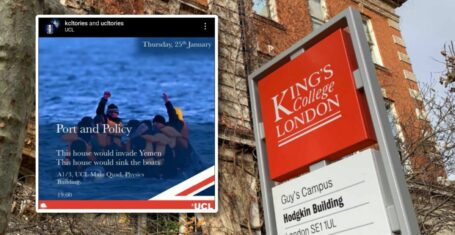
2am seminars and no library books: King’s international students on online learning
‘My sleep’s been so messed up as I just can’t relax’
None of us envisioned our uni experience to pan out the way it has. But perhaps the most let down by online learning is Kings’ international cohort. There is a new set of pressures that comes with navigating a virtual university experience for international students. With Covid causing cuts to everything but their fees, we spoke to international students about the struggles of online learning.
‘The time difference means I have 2am seminars’
Whatever you do, do not complain about your 9am seminar to an international student.
Katie*, a third year English student from Korea, tells us that the “awkward” time difference has been the most challenging part of online learning: “I have it quite bad, as some of my seminars end at 2am.” This is exhausting and she “finds it difficult concentrating in my online seminars.”
These late night seminars have taken a toll on Katie’s sleep schedule. She told us: “My sleep’s been so messed up as I can’t just relax after such intense discussions.”
‘It’s difficult to find books that would be in the Maughan or Senate House Library’
An additional cause for concern is the lack of access Katie* has to resources as an overseas student. Although some lecturers have uploaded PDF links or e-books, she explains that many of the course texts are difficult to source in Korea. Whilst many local students could access these readily through the Maughan, this isn’t an option for her: “I could be disadvantaged if I weren’t savvy enough with finding the online materials.”
Even for domestic students, online learning has affected access to campus. However, the situation is even worse for Katie* as “there isn’t always an online link for library texts.” She feels that “King’s should be doing everything to make online learning fair”, and this isn’t the case when “getting my hands on material is difficult.”

‘From what I’ve heard from my cohort, financial aid has largely been non-existent’
Not only has online study been costly in terms of time, but also in fees. International medical students are paying over £40k annually, and dental students a massive £45k. International fees for most courses sit somewhere between £20k and £30k annually (e.g Economics: £28k, Film Studies: £21k, Psychology: £28k, Geography: £21k). Perhaps costs were more justifiable when they included a social and cultural experience of London, as well as access to on-campus buildings and resources. However, many students feel these fees are less justified when the degree is being done from their own bedroom.
Nour, a third year Political Economy student, says: “We don’t have access to any King’s facilities that we’re paying money for, nor any of the side benefits (like social connections) that come with uni.” Consequently, he believes this should be reflected in the tuition fees, saying he feels “a partial refund is crucial.”
Gianni, another Political Economy student, said: “A lot of students feel like they are paying for things they can’t use, and for international students who pay upwards of 20k this is actually a huge problem.” Receiving little to no concessions, international students have been left disillusioned with this restricted, yet costly, access to campus.
‘I do feel bad for incoming freshers though’
Gianni also sympathises with the international cohort of freshers. On the one hand, he doesn’t feel that he has missed out on his uni experience as he “already had a whole network of people to count on and I had my freshers.”
However, for most international students, this may be the first time they have lived abroad, yet with limited opportunities to meet face-to-face, it’s more difficult to develop a strong support network at university.
Nour says that as “libraries and campus would not really be accessible, a lot of people have been really lonely-people without family in the country etc.”

‘Communication with the uni was frustrating’
Nour says he feels “the main problem lies with how Kings communicated about this school year.” He expresses his frustration at how “they had more than half a year since the start of the pandemic to plan all of this, and they still waited until September/October to tell us about all the specifics.” In particular, Nour is angered by the university’s double standard when it comes to communication: “It’s especially frustrating considering how strict King’s is with deadlines and resits towards us, but they don’t have any of their own stuff organised.”
Daniel*, an Economics student, was also kept in limbo by the university. Back in March, international students were given very little support when faced with the dilemma of where to lockdown. On a study abroad programme at the time, Daniel* says “clear guidance only came after borders were already closing meaning many of us had to make the decision by ourselves with all the uncertainty that came with that.”
‘It’s a situation that sucks, but it could suck a lot more’
Despite their criticisms of King’s, the international students The Tab spoke to were able to put a positive spin on their experiences of online learning.
Katie* is impressed at how “individual seminar leaders have been putting in a lot of effort” and she understands that “the uni could not accommodate the awkward time difference for everyone.”
Additionally, Gianni says he “can’t blame the university for taking sanitary precaution”, and Daniel* understands that the university faces an impossible situation: “I’m not sure exactly what they would be able to do, I haven’t seen other unis do anything specific that’s much better.”
Whilst online learning might not be plain-sailing, overseas students appear to be taking the rough with the smooth.
—
When asked to comment on the situation, a King’s College London spokesperson said: “We understand the ongoing pandemic has been incredibly challenging for all our students, including those who have not yet been able to travel to London and are overseas.
“Our commitment to protect the health of our community remains our priority through our flexible blended approach to learning. All lectures and larger classes are being held online, while where possible, students and staff will be on campus for some small group teaching, practical classes and bookable library and study spaces, all at a safe distance.
“Our individual programmes have been developed by faculties to deliver the same high-quality education and with support for remote learning, to the greatest extent. The specific arrangements for each programme vary from programme to programme. Faculties have and will continue to work hard to adapt timetables to support those living in different parts of the world, wherever possible. Where students are encountering specific timetabling issues, students should contact their departments, who will do all they can to make adjustments.
“We have invested significantly to review core reading lists and deliver online access of core readings. Where online versions of core texts are not currently available, we have digitised chapters within the limits of copyright law. We have put in place a range of measures to help support students to find the online readings that they need and provide 24/7 support if core readings cannot be found. We also have a range of online self-help resources: https://www.kcl.ac.uk/library/collections/eresources. We continue to encourage all students to contact the library if they need any help regarding their core reading or access to support workshops and webinars: https://www.kcl.ac.uk/library/contact.
“We are keeping our approach to delivering learning, teaching and assessment under continual review and working with KCLSU to do as much as we can to deliver activities on campus.”
*Names have been changed for anonymity. Photos used are not of the students interviewed.
Related stories recommended by this writer:
• King’s announces all study abroad programmes at the University of California are suspended
• Opinion: Cancelling year abroads is a tragedy
• ‘Extremely poor’ communication and ‘inflexibility’: the experiences of King’s offer holders









































